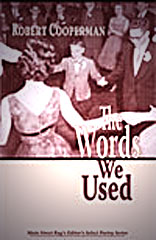
This is the first time that I am reviewing a book that is a part of my own life; it would be foolish for me to pretend to any great degree of objectivity. Still and all I hope that you will take these words in the spirit with which they are given. Bob Cooperman and I met as children in an apartment building on East Seventh Street in Brooklyn and, after college, lost track of one another for many years. I’m probably a poet because Bob always planned to become a writer and I wanted to do whatever it was he was doing. We reconnected after our joint appearance in the same literary magazine and have never lost sight of one another again. Fortunately our aesthetics as well as our politics diverged so that what one did best the other had little interest in doing. Nevertheless, Bob is multitudinous in his interests and his productivity. He has become the master of the verse novel, biographies of western miners, pioneer women and romantic poets told in one or two page chapters, each a masterful lyric poem, the whole of it connected with passion and free rhythmic expression. The best of these books I feel are his fictionalized biographies of Keats, Petitions for Immortality (Higganum Hills, 2003) and Shelley, In The Household of Percy Bysshe Shelley (University of Central Florida, 1993). He has produced thematic volumes about Irish adventurers and tributes to his beloved Grateful Dead. His phenomenal memory has saved my childhood for me, how we grew up in a mixed neighborhood of Jews and Italians and Blacks, the books we discussed, the loves we despaired of.
Cooperman’s new book is practically a dictionary of words from a language that is rapidly disappearing because its few “native” speakers are leaving us, the remnant left after the Holocaust now almost extinct.
It was inevitable perhaps that his great gift would finally extend to his own ethnic heritage, making his voice felt in individual lyric poems of humor, charm and tenderness. The Words We Used (Main Street Rag, 2009) is that book, his claim upon the world that fed and nurtured us. Billy Collins likes to tell his new students that they are not majoring in English but majoring in death; it’s the temporary nature of living things that makes them so beautiful, that brings us the heartache. Cooperman’s new book is practically a dictionary of words from a language that is rapidly disappearing because its few “native” speakers are leaving us, the remnant left after the Holocaust now almost extinct. But this is primarily a joyous book, one filled with humor and explosive scenes of exuberant eating, doomed sex, and vituperative cursing, not to mention a dollop of violence and a schmear of adolescent longing. Like any complex language, Yiddish encompasses the entire human comedy and is more expressive than most. Jewish writers, comedians and film-makers have been major contributors to the development of American culture in the 20th century and, correspondingly, the impact of Yiddish on American English has been profound. Many of the words will be quite familiar to the average reader who no doubt will be surprised to see how many of the words he or she already uses on a daily basis.
Poems about food tenderly conclude with ruminations on marriage and its dissolution; poems about sex invoke images of dietary excess.
The book is organized according to four broad themes in sections of twenty to forty poems: “the food we ate”, “the people we knew”, “the words we used” and “for all my extended family.” Many of the poems cover all of these subjects and would fit equally well in more than one section; the result of such narrative richness is a distinct lack of thematic boredom. Each poem is titled by a Yiddish word or phrase and then defined by a memory as painfully nostalgic as a photograph. “My brother can eat more/ by accident than other people/on purpose” his father says and immediately we know we are in sure hands. Friday nights bring “boiled chicken”, like the execrable potato of Tom Lux’s famous poem about his childhood refrigerator, and extreme metaphors of the family eating like “pythons making a deer disappear.” Poems about food tenderly conclude with ruminations on marriage and its dissolution; poems about sex invoke images of dietary excess. Here in its entirety is one very self-revealing poem among several on the subject of the penis; it comes from the third section:
SCHLONG—
1.a snake; 2. (slang) a penis—The Jewish Word Book
In one of his novels
Philip Roth has his protagonist
describe, at length—pardon
the pun—the size and heft
of his father’s penis:
huge as a boa constrictor,
a veritable schlong.
Once, when I was very young,
I confided to my mother
I feared I wasn’t well-enough
equipped in that department:
a garter snake, not a python.
“Do you know,” she laughed
to ease my anxieties,
“what I called your father’s?
Little John.”
“Good God” the dread thought
made me shudder, as if coming
across a rattler sunning itself
in the middle of my bed,
“what’s mine, then, Tiny Tim?”
Then, the second grim revelation:
“She’d known men before my father,”
I blinked back the hissing sight
of my mother shedding,
again and again, her serpent skins.
Note the lovely half-rhymes, the natural rhythm, the conjunction of cultural reference, sly humor and Freudian cold shower. Throughout the book, the voice is sure, the line breaks are clean, the tenderness of serious humor everywhere, echoes of the Holocaust, the Old World, the civil rights struggle in the New. His father’s funeral, his grandmother poking the ceiling with a broom handle, “breasts elegant as Irish setters”—what Cooperman doesn’t remember never happened. Like the rye-bread ad says, you don’t have to be Jewish to love this book; take it from me, it’s his best.

